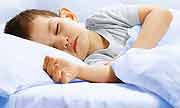- Double Mastectomy May Offer No Survival Benefit to Women With Breast Cancer
- Toxic Lead Found in Cinnamon Product, FDA Says
- Certain Abbott Blood Sugar Monitors May Give Incorrect Readings
- Athletes Can Expect High Ozone, Pollen Counts for Paris Olympics
- Fake Oxycontin Pills Widespread and Potentially Deadly: Report
- Shingles Vaccine Could Lower Dementia Risk
- Your Odds for Accidental Gun Death Rise Greatly in Certain States
- Kids From Poorer Families Less Likely to Survive Cancer
- Tough Workouts Won’t Trigger Cardiac Arrest in Folks With Long QT Syndrome
- At-Home Colon Cancer Test Can Save Lives
Teaching Sleep Tips to Parents Seems to Help Kids With Autism


FRIDAY, Sept. 27Sleep education for parents of children with autism helps improve the youngsters’ behavior and quality of life, according to a new study.
Autism is a neurodevelopmental disorder marked by difficulties in social interactions and communications. Autism spectrum disorders encompass a wide range from mild to severe.
For the study, researchers provided sleep education for the parents of 80 children, aged 2 to 10, with an autism spectrum disorder. During the sessions, the parents learned about daytime and evening habits that promote sleep, including the importance of increasing exercise, limiting caffeine, and lessening the use of video games and computers close to bedtime.
In addition, sleep educators helped the parents create a visual schedule for their children to help them establish a bedtime routine and talked about ways to help kids get back to sleep if they woke up at night.
“We found that one hour of one-on-one sleep education or four hours of group sleep education delivered to parents, combined with two brief follow-up phone calls, improved sleep as well as anxiety, attention, repetitive behavior and quality of life in children with [autism spectrum disorders] who had difficulty falling asleep,” study author Dr. Beth Malow, a professor of neurology and pediatrics, and a professor of cognitive childhood development at Vanderbilt University, said in a university news release.
“The parents also benefited; they reported a higher level of parenting competence after completing the education sessions,” Malow added. “The one-on-one and group sessions showed similar levels of success. In contrast, an earlier study that simply gave parents a pamphlet without guidance on how to use it did not provide the same level of improvement in child sleep.”
The study was published in a recent issue of the Journal of Autism and Developmental Disorders.
Future research is needed to determine the best methods for providing sleep education to families, including telemedicine- and Internet-based approaches, Malow said. She and her colleagues within the Autism Speaks Autism Treatment Network are also building partnerships with local pediatric practices to offer training on sleep education.
More information
The U.S. National Institute of Neurological Disorders and Stroke has more about autism.
Source: HealthDay
Copyright © 2024 HealthDay. All rights reserved.










